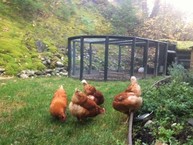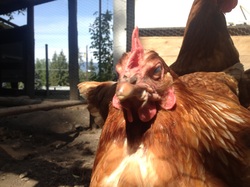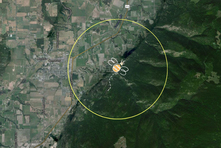In this blog we’d like to tell you a little bit more about the origin of the ingredients we use for our products, and the choices we make with regard to these ingredients. In passing we'll also promote our suppliers. After all, without them there would be no organic, local products available!
A few weeks ago we started putting ingredients labels on our products. The label also tells you whether the ingredients are organic or not. As you may know most of the ingredients of our products are certified organic. If any of the products is not, the label will tell you. Unfortunately the prices of organic ingredients are significantly higher than non-organic ingredients, but that makes your gevulde koek, which does contain (organic cane) sugar, tasteful and at least a little bit healthy!
Certified organic
Our products themselves are not certified organic. In order to label our products 'certified organic' we'd need to go through a long and costly process. Until then, if we ever choose to spend money on certification, you'll have to take our word that we try our utmost to find organic, local, non-GMO ingredients. In case there's no organic or local version of the ingredient we need available, we'll make another choice that we can justify to our customers.
Some examples:
Our products themselves are not certified organic. In order to label our products 'certified organic' we'd need to go through a long and costly process. Until then, if we ever choose to spend money on certification, you'll have to take our word that we try our utmost to find organic, local, non-GMO ingredients. In case there's no organic or local version of the ingredient we need available, we'll make another choice that we can justify to our customers.
Some examples:

Non-GMO (non-Genetically Modified Organism)
Other than the other ingredients we use for our stroopwafels (syrup waffles) the sugar syrup is not organic, simply because it's not available (or: we haven't found it yet). Instead we choose to use Dutch syrup, because rules with regard to production and additives seem to be stricter in the European Union. The sugar syrup we use is not organic, but it's non-GMO, and most of all: it's very tasteful!
Other than the other ingredients we use for our stroopwafels (syrup waffles) the sugar syrup is not organic, simply because it's not available (or: we haven't found it yet). Instead we choose to use Dutch syrup, because rules with regard to production and additives seem to be stricter in the European Union. The sugar syrup we use is not organic, but it's non-GMO, and most of all: it's very tasteful!

Fair Trade
The spices for the speculaas among others, are imported from a company called Frontiers. Some spices like cinnamon are imported by this company from tropical countries where human rights are not always taken seriously. In case the spices are produced in countries like these we also know that these spices are, next to organic, also ‘Fair Trade'. ‘Fair Trade’ is a trading partnership, based on dialogue, transparency and respect, that seeks greater equity in international trade. It contributes to sustainable development by offering better trading conditions to, and securing the rights of, marginalized producers and workers' (World Fair Trade Organization).
The spices for the speculaas among others, are imported from a company called Frontiers. Some spices like cinnamon are imported by this company from tropical countries where human rights are not always taken seriously. In case the spices are produced in countries like these we also know that these spices are, next to organic, also ‘Fair Trade'. ‘Fair Trade’ is a trading partnership, based on dialogue, transparency and respect, that seeks greater equity in international trade. It contributes to sustainable development by offering better trading conditions to, and securing the rights of, marginalized producers and workers' (World Fair Trade Organization).

Eggs
We have to admit that also the eggs that our our girls lay, are not organic (although the mash we feed them is certified organic). Since the food we eat ourselves is organic as much as possible, so are our leftovers that we feed them (vegetables, fruit). However much we wished they were vegetarian, they're not. Every now and then they like to pick a worm out of the soil and they also don't mind a few bugs from time to time!
We have to admit that also the eggs that our our girls lay, are not organic (although the mash we feed them is certified organic). Since the food we eat ourselves is organic as much as possible, so are our leftovers that we feed them (vegetables, fruit). However much we wished they were vegetarian, they're not. Every now and then they like to pick a worm out of the soil and they also don't mind a few bugs from time to time!

We do think though they have a good life. They have lots of room to potter about in their coop and pretty much everyday we let them out of the coop were unfortunately they always try to ruin our garden! The fact that these 4 chickens give us 4 eggs pretty much every day, shows us that they're happy!

Honey
The honey we use comes from our own bees and officially is not organic. It would be very hard to check whether the nectar our bees collect comes from organic plants and crops since bees fly approximately 3 kilometers from their hive. The hives on our flat roof collect most of their honey in the mountains as you can see on the picture.
Another requirement for the honey to be labelled organic is that there shouldn't be any treated wood within reach of the bees. Unfortunately it's hard to avoid this since nowadays pretty much everyone has treated wood in their garden.
Next year we’ll also have honey from our bee yard in the West Side Road area. There are no farmers within reach of the bees from this bee yard. They get their nectar from sagebrush and other wild flowers. We're very curious about the taste of this honey!
In our next blog we’ll tell you a little bit more about our bees! Soon we’ll be harvesting our honey! Exciting!
Marij & Arnold
The honey we use comes from our own bees and officially is not organic. It would be very hard to check whether the nectar our bees collect comes from organic plants and crops since bees fly approximately 3 kilometers from their hive. The hives on our flat roof collect most of their honey in the mountains as you can see on the picture.
Another requirement for the honey to be labelled organic is that there shouldn't be any treated wood within reach of the bees. Unfortunately it's hard to avoid this since nowadays pretty much everyone has treated wood in their garden.
Next year we’ll also have honey from our bee yard in the West Side Road area. There are no farmers within reach of the bees from this bee yard. They get their nectar from sagebrush and other wild flowers. We're very curious about the taste of this honey!
In our next blog we’ll tell you a little bit more about our bees! Soon we’ll be harvesting our honey! Exciting!
Marij & Arnold





 RSS Feed
RSS Feed